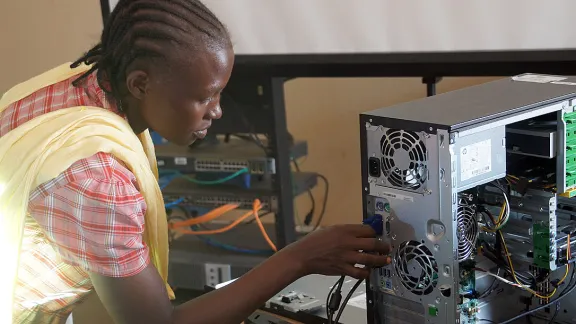
Primary school teacher Afrina Zechariah Anabak inspects the connection ports on her computer. Photo: LWF/C. Kästner
Teaching in the Global Village
(LWI) - “In most cases the mouse is green and the keyboard purple,” the teacher explains. 27 men and women stretch their necks and inspect the back frame of their PCs to find the connector ports the young woman in front of them is talking about. It’s the first class of the “Informatics, Computer and Technology” (ICT) project at Ajuong Thok refugee camp.
Sponsored by The Lutheran World Federation (LWF), UNICEF and Vodafone foundation, 2000 primary and secondary students will be given tablets to learn basic computer skills. But before the students can be instructed, the teachers have to learn how to use a computer themselves.
Therefore, the group of 27 men and women put in an extra shift after their classes are finished. It is a mixed group, some trained teachers, others volunteers, among them two women. “I want to learn how to use a computer, because they store data,” Artum Noah Kansal (27) says. “All the information you need is there”.
The mother of four, like everyone else in the camp, comes from the Nuba mountains. After conflict broke out in the Kordofan region, Sudan, she fled with her family. Schools free of charge were the reason she relocated from Yida refugee camp, where she first arrived, to Ajuong Thok.
Overcome the road blocks
The LWF is the sole implementer of education at Ajuong Thok camp, with three Primary and one Secondary school, and the Accelerated Learning Program (ALP) for over-age learners of primary level, which is financed by the ECHO Children of Peace grant. “The students are eager to learn,” team leader Anne Mwaura says, “but there is zero literacy on computers, even among the teachers”. When Vodafone foundation offered tablets to teach computer skills to the students in school, it became evident that the teachers themselves needed computer training. The first group to be trained consists of 150 teachers and graduates.
“We want to learn how to use the internet,” Mati Amin Kadam (26) says. He teaches at Napata Primary School, which together with Soba Secondary School was connected to the World Wide Web a few months ago.
“We are moving towards a global village,” LWF team leader in Ajuong Thok, Anne Mwaura, says. “By teaching the refugee students how to use computers, we help them catch up with the rest of the world.” On a more practical level, they would also be able to stay in contact with relatives who live in other camps or have been re-settled abroad.
Mwaura hopes that the teachers will also use the internet for good quality teaching in school. “The big challenge in South Sudan is that there are not enough academic resources,” Mwaura explains. “However, there is good teaching material available online. The teachers can get case studies and additional material from there.”
Since road transport is often impossible either due to conflict or flooding in the rainy season, school materials are hard to come by. The internet could help the refugees in Ajuong Thok overcome the road blocks which often delay their supplies.
Distant Learning Programs
But Mati Kadam is not only thinking of his students. Like many others, he also hopes to further his own education with the help of distant learning opportunities. “I would like to complete university and study management,” he says. His colleague Abass Jalhalla Koriss plans to attend long distance classes to further qualify as a teacher.
Offering tertiary level education is also the dream of LWF team leader Anne Mwaura. “Education is the pull factor for refugees to favor Ajuong Thok camp,” she says. Schools in Ajuong Thok are overcrowded. The first group of primary students has been sitting their final exams, which will enable them to go on to secondary school. Soon the secondary school will have the first graduates as well.
Mwaura hopes to provide tertiary level education through distant learning programs, for example from the University of Juba. In the long term perspective she thinks of linking up with other facilities for various fields of study. “This would be the only tertiary training available in the state,” she says.



